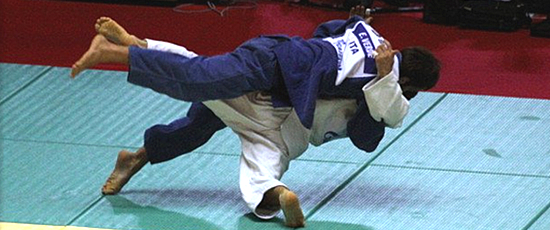Judo [en]

Judo is a combat sport which is popular all over the world. It originated in Japan in the late 19th century, thanks to Jigoro Kano who merged the principles of various ju-jitsu schools. Judo literally means "the way of gentleness", that is, do not oppose any resistance to the force that comes at you, but rather use it and direct it to your advantage.
The aim of judo is to cause the opponent lose his/her balance, throwing him or her to the floor, or holding the opponent down on his/her back for a certain time, or forcing an opponent to surrender.
Judo practitioners wear a uniform called judogi, consisting of trousers and jacket made of double weaved cotton, held together by a coloured belt. The colour of the belt indicates the judoka's rank and experience.
During competitions athletes must wear a white or red belt, for ease of distinction by judges and referees. In international tournaments and championships, including Olympic events, one of the opponents must wear a blue judogi to be better distinguished by spectators, especially on television.
Judo contests last 5 minutes, however the referee stops the clock during breaks in action.
Judo scores, in ascending order, are called: koka, yuko, waza-ari, ippon. A higher score will always beat any number of lower scores, in fact a yuko beats any number of kokas, and so on. If the match ends in a tie, before an ippon is scored, they are used as tiebreakers: if one player has scored a waza-ari and the other has not, the player with the waza-ari wins, but if they are equal, yukos are used to break the tie. If they are also equal in yukos, kokas break the tie. The principle is to reward the most effective technique. Scoring two waza-aris equals an ippon, which is the move that makes you win immediately.
Ippon is scored by throwing the opponent onto his back with a powerful and fast move or by pinning the opponent on his/her back in contact with the mat for a period of 25 seconds or forcing the opponent to submit through a strangle or an armlock.
Waza-ari is scored when the throw on the back is not executed with the necessary power or speed. It can be awarded when the opponent land on his/her side but immediately touches the mat with the shoulders or in case of a pin lasting less than 25 seconds, but more than 20 seconds.
Yuko is scored when the athlete throws his/her opponent on the side or on the back, though the technique is partially lacking in speed and force. It can be awarded also when the opponent is pinned down for 15 seconds or more, but less than 20 seconds.
Koka is scored when the opponent falls on his/her thighs or buttocks or is pinned down for less then 15 seconds, but more than 10 seconds.
If an athlete commits a forbidden act he/she is penalized by a shido, which equals a koka in favour of the opponent; if the infringement is repeated the penalty increases and a chui is given, which equals a yuko to the opponent. The next penalty is keikoku, which adds a waza-ari to the opponent's score, and the most serious one is hansoku-make which entails disqualification and gives the opponent an automatic victory.
Weight classes
Like all combat sports where the physical size is relevant, judo too is divided into weight classes.
Judo made its very first appearance at the Olympic Games in 1964 inTokyo and returned in 1972 at the Munich Games, when it was officially included in the Olympic programme.
(modificato il 12/03/2015)







